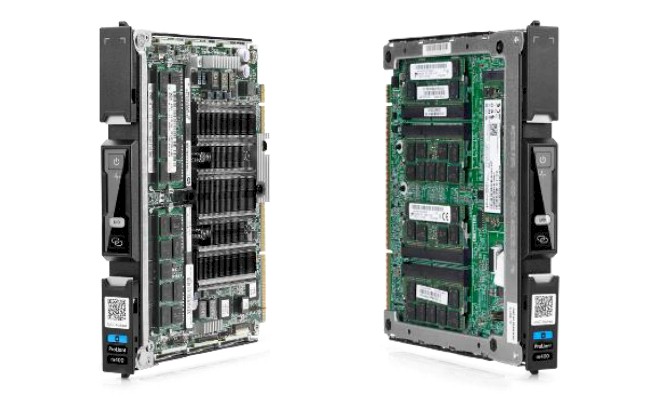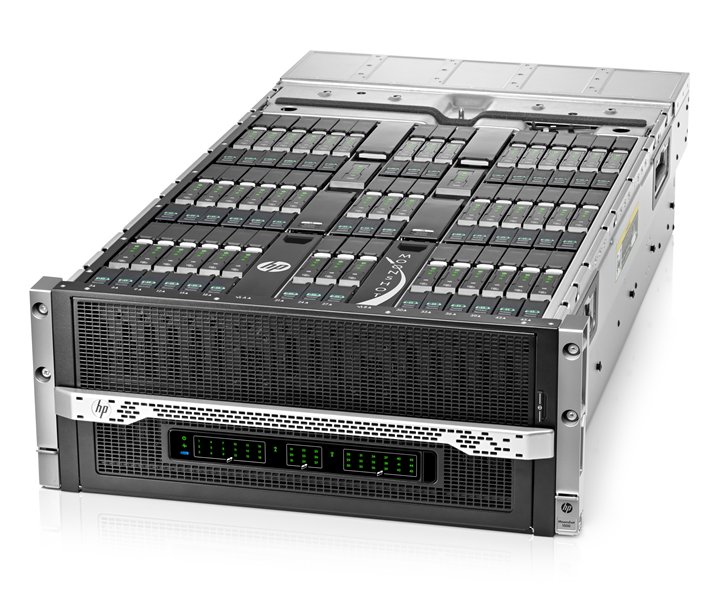For Servers, HP Bets On ARM (Again)
In 2011, HP and Calxeda formed a partnership for ARM-based servers for datacenters. The idea was to make servers out of tens or hundreds of small ARM processors that can handle simple data transactions (such as web requests), that can scale well and that use little power.
It was a good idea, except for one problem: ARM chips weren't ready for servers at that time. Calxeda, a startup striving to design ARM chips for servers, built its first server chips around the 32-bit Cortex A9 CPU. Unfortunately for the small company, 32-bit chips don't work very well in datacenters, and Cortex A9 wasn't powerful enough to handle server tasks, either.
Calxeda also had some delays. By the time the company came out with its first server chip, the Cortex A9-based EnergyCore ECX-1000, the next-generation Cortex A15 CPU supporting up to 40-bits of memory was already out. A newer 28nm process was developed, making Calxeda's 40nm chip obsolete in terms of performance/power. Finally, HP decided to forget about Calxeda, make its chips architecture-agnostic, and just use Intel Atom chips for its Moonshot servers. Several months later, Calxeda announced bankruptcy.
HP doesn't seem to have forgotten its original vision about focusing on low-power/high density ARM chips for datacenter servers. It recently partnered with Applied Micro, the first company to ship an ARM chip that is finally ready for servers, thanks to its 64-bit ARMv8 ISA and its custom core optimized for server use.
Today, HP announced the new Proliant m400 server using Applied Micro's X-Gene chip which comes with eight 2.4 GHz custom ARMv8 cores. A single m400 has 45 of these X-Gene cartridges, and each cartridge supports up to 64 GB DDR3 RAM and 480 GB flash storage and runs Ubuntu server 14.04 LTS.
Applied Micro isn't the only company making ARM server chips for HP's Moonshot servers. Texas Instruments and AMD are also working on it. AMD will ship its Cortex A57-based server chip later this year, while TI is shipping a Cortex A15-based server chip right now. However, the TI server chip doesn't support the latest ARMv8 ISA, making it suboptimal for enterprise use. HP only supports Ubuntu for these systems, but the company is "interested in working with Red Hat" and other Linux suppliers as well.
Applied Micro and AMD may be shipping the first real ARMv8 chips for servers this year, but it's still early for ARM chips in the server market. As Cavium and Broadcom join them next year, and Applied Micro releases a new generation X-Gene chip, the competition should heat up. With several big players already in the market, their products should quickly improve, which could then raise the interest of more enterprise customers for efficient ARM-based server chips.
Get Tom's Hardware's best news and in-depth reviews, straight to your inbox.
Follow us @tomshardware, on Facebook and on Google+.
Lucian Armasu is a Contributing Writer for Tom's Hardware US. He covers software news and the issues surrounding privacy and security.
-
IInuyasha74 I don't really understand this. Why use ARM to do this and have to get around all the barries and troubles with making an ARM server like this when MIPS servers based on the same idea have been built for over a decade now?Reply -
anthony8989 Isn't it obvious? ARM chips cost less. Plus it's built on a more malleable ecosystem which will be beneficial later on.Reply
But mostly it's about the bottom line.
And it's only natural that ARM starts branching off into auxiliary micro processor markets . -
NotExpertAtAll yeah I agree. with ARM the bottom line is cost of ownership and data center's power use is becoming the thorn on every companies overhead expenses. If they can reduce expenses on data center operations, they would have invested on MIPS and ARM due to lower power usage per cpu core.Reply
But I think Intel Atom/Bay Trail is one of the competition on this environment too. -
ethanolson ARM makes more sense than MIPS because the programmers available as well as the ported OS infrastructure. It's comfortable and commoditized.Reply -
IInuyasha74 MIPS sells complete CPUs for just as cheap as ARM.Reply
They are fully compatible with both Windows, Android, Linux, and several other operating systems. -
anthony8989 The key factor that will drive adoption of the ProLiant m400 cartridge for Moonshot or any other ARM-based servers will be whether or not they can deliver measureable value for customers when compared to their existing server solutions and for that matter, what other processor manufacturers brings to the table. For the majority of large scale datacenters, this value is measured in total cost of ownership (TCO) which includes both the acquisition cost of the equipment and the operating cost of using this equipment during its lifetime.Reply
http://www.forbes.com/sites/patrickmoorhead/2014/09/29/hewlett-packard-launches-the-first-64-bit-arm-server-with-applied-micro-circuits-x-gene/ -
ldo I was going to suggest MIPS, too. As the world’s second-most popular CPU architecture (after ARM), they should be worth a shot.Reply -
IInuyasha74 That and MIPS was originally designed for severs. In fact some of the most powerful super computers in the world ever built use MIPS.Reply -
anthony8989 "Servers " is too vague a term in this context. That's probably what is confusing you. This Proliant m400 is geared specifically toward "simple data transactions (such as web requests), that can scale well and that use little power."Reply -
IInuyasha74 Reply14281938 said:"Servers " is too vague a term in this context. That's probably what is confusing you. This Proliant m400 is geared specifically toward "simple data transactions (such as web requests), that can scale well and that use little power."
I'm not confused at all.
http://en.wikipedia.org/wiki/SiCortex
SiCortex for a long time made scalable MIPS based servers. The most powerful of these could do 8.2 teraflops of computations. It would take roughly 87 Intel Core i7-4770k CPUs to do the same amount of work, while consuming more power. These systems could be scaled all the way down to 10w 6 Gflops systems or anywhere in between, and this was back in 2007. In that amount of time MIPS has significantly reduced power consumption and increased performance. They sell for roughly the same amount as ARM, were designed for servers, have a history of being used in servers, work with all major OS types with the exception of Apple, and offers higher performance per watt.
While I can understand while building desktops like this is a bad idea, since Single-threaded performance would be terrible and applications don't have near the ability to make use of so many threads, it makes no sense not to make severs out of them.

